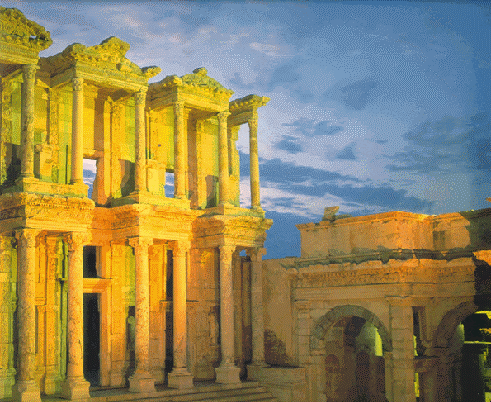 Ancient Libraries
Ancient Libraries Ancient Libraries
Ancient Libraries
The ancient library is a curious topic. The basic evidence has been collected, long since, but the compilations are neither thoughtful nor up to date. One would think to find a more or less definitive treatment, but the fundamental works on the topic are surprisingly thin: bare compilations of evidence such as Boyd 1915, Callmer 1944, Platthy 1968, Strocka 1981; a trio of dissertations from the 1980s (Dix 1986, Fehrle 1986, L. Johnson 1984), only one of which is published; a 2001 Yale Press book by Lionel Casson that while competent and entertaining is also surprisingly, even shockingly superficial. The interesting questions seem hardly to have been asked, and never to have been addressed in any detail. By this I mean quite fundamental questions about the use and function of these institutions, and how that use or function differed in differing times, places, and (therefore) cultures about the ancient mediterranean. A good example of the sorts of problems we'll have to deal with is encapsulated in the depiction below of the library in Trajan's Forum, in which a comfortingly familiar scene is presented of the reading room. But in fact we have no evidence for Romans reading at desks in the way depicted, nor any compelling reason to conclude that the space was used in this way.
The evidence for the ancient library is a fascinating if challenging mixture of archaeological evidence, scattered remarks in literary texts, and (mostly very fragmentary) inscriptions. Most of the evidence is difficult to interpret, and a first goal will be to collect and evaluate evidence for the libraries themselves, and what we know or think to know about their physical disposition, physical features, logistical circumstances, associated institutions, cultural position in society, and user activities. The seminar will be run in part then as a sort of workshop, in which we help one another compile evidence, and address in detail the problems of evidence evaluation.Along the way we'll need to construct what we think are the proper questions to ask, and to formulate at least some provisional conclusions. The format of our weekly meetings will be a mix of lecture by the instructor and presentation by the participants in the seminar with discussion. The results of these weekly meetings will be shared lists of primary evidence, texts and images, which I will make mutually available on our web pages (http://classics.uc.edu/johnson/libraries) for consultation in and out of class. Towards the end of the term, you will present a formal paper of 30-40 minutes which addresses a larger question stemming from this evidence. That oral paper will normally be a part of or digest from the final written paper (due at the time scheduled by the registrar for the final exam).
Following is a preliminary list of weekly topics.
1. The question of what questions to ask. Introduction to ancient books, book production, distribution, use. Near Eastern antecedents.
2. Conspectus of Greek and Roman libraries in the East. The nature of the (literary, inscriptional, archaeological) evidence. Focus on Athens, Pergamon, Ephesus.
3. Conspectus of libraries in the West. Focus on Rome, Timgad.
4. Introduction to the library at Alexandria. Scholars, scholarship, and librarians. Kallimachus and the "pinakes". Learning, learnedness, and the Museion.
5. Relation of Museion and Bibliotheke to religious and royal institutions. Logistical organization of Greek libraries.
6. Evidence for the earliest Roman libraries. The problem of the Greek inheritance. The function and use of libraries before Pollio. Cicero, Atticus, Lucullus.
7. Libraries at Rome. Forum of Trajan.
8. Organization and function of imperial libraries.
9. Reports.
10. Reports, conclusions.
